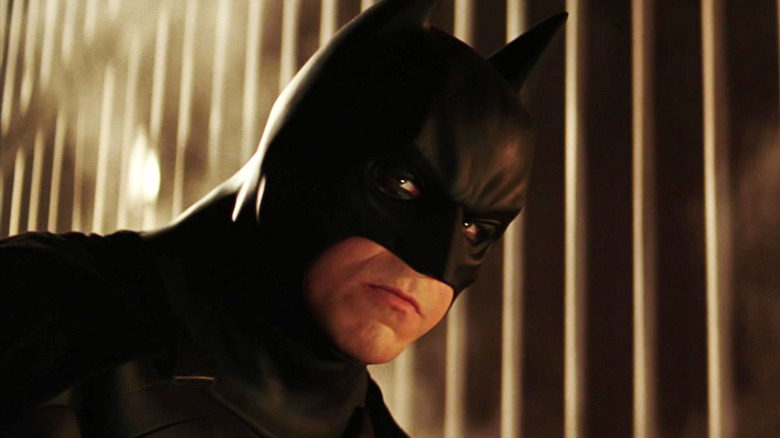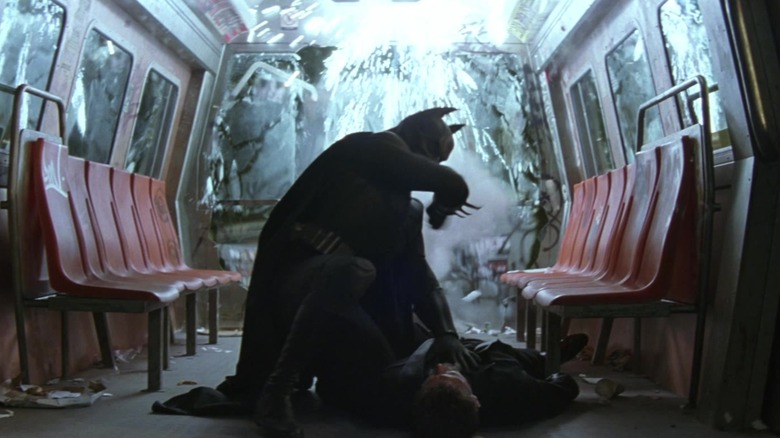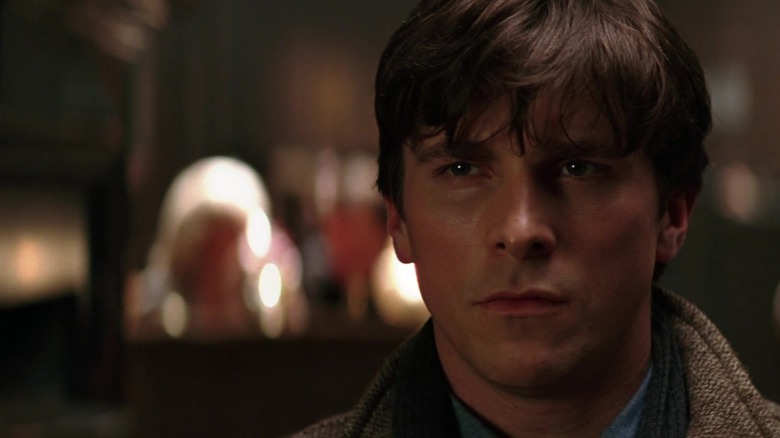Why Christopher Nolan Didn't Make A More Adult Version Of Batman Begins
In the early 2000s, some of the biggest blockbuster franchises were in trouble. 2002's "Die Another Day," widely considered the worst James Bond movie, had almost finished off 007 for good just five years after "Batman & Robin" had seemingly dealt the same fate to the Dark Knight. Comic book fans would have to wait until 2008 for "Iron Man" to change Hollywood forever and herald the rise of the Marvel Cinematic Universe, and action films generally seemed to be experiencing a protracted crisis of identity. What exactly did audiences want in a post-9/11 world where some of the most popular big-screen heroes had been essentially reduced to laughing stocks? Grittiness, apparently.
"Gritty" became the buzzword of the early 2000s, thanks in part to Matt Damon's Jason Bourne, who came along in 2002 with "The Bourne Identity" and provided a welcome rubric for action filmmaking. Suddenly, the "gritty reboot" became a thing and both Bond and Batman were dutifully given the treatment. 007 wouldn't get his gritty reboot until 2006 with "Casino Royale." But Warner Bros., who'd been searching for a way to reintroduce the Dark Knight ever since "Batman & Robin," made sure to take advantage of the trend a year earlier, debuting Christopher Nolan's "Batman Begins" in 2005 and re-establishing both the franchise and Batman himself as a massive pop cultural force.
But as "gritty" as Nolan's movie was, it wasn't as dark as you might expect given that descriptor. This wasn't the kind of grit you might have seen in, say "Seven," the celebrated David Fincher crime drama that Matt Reeves later emulated with 2022's "The Batman." Nolan made a movie that certainly felt more realistic than "Batman & Robin," but which steered clear of anything that might truly disturb or upset younger viewers. Obviously Warner Bros. wasn't interested in shutting out a large portion of its target audience, but it seems the decision to keep "Batman Begins" gritty yet relatively light also came from Nolan.
Christopher Nolan never had ambitions to make an R-rated Batman movie
Since it hit theaters, "Batman Begins" has stood as one of, if not the most prominent and successful examples of the "gritty reboot," a trend which even saw Stallone bring back Rocky Balboa for a sixth movie. What exactly does the phrase even mean? Well, like most of these things, it sort of stopped meaning much very quickly after it emerged. But in the case of "Begins," it meant we got a story grounded in a world that closely resembled our own and which dealt with weighty themes that went beyond showcasing cool Bat-gadgets and fight scenes. "Grounded" was the other word you'd hear in relation to the film, and director Christopher Nolan certainly tried to keep his vision of the Dark Knight from veering too far into the fantastical. But while the film took on this reputation for showcasing what Batman might look like were he to exist in the real world, "Begins" was still very much a fantasy.
In the documentary "The Fire Rises: The Creation and Impact of the Dark Knight Trilogy," Nolan talks about his desire to present a believable yet almost hyper-real cinematic world. "It's not necessarily about a direct reality," he said, "because I think the films are extremely heightened and they're extremely operatic. But it's about what I suppose you might term a cinematic reality." That cinematic reality was a sweet spot, allowing Nolan to entertain some fanciful elements while maintaining a sense of believability, setting his film apart from previous iterations of the Dark Knight in the process. It also meant the film occupied a nice middle ground between exploring mature themes without veering into adult territory that would have prohibited younger viewers from watching. For Nolan, that was an important part of the equation.
At a London press conference around the time of the film's release (via TimeOut), Nolan and the cast gathered to discuss the reintroduction of Batman to the masses. The director was asked about whether there might be a more violent version of "Begins" for the DVD market, but was insistent that the movie released in theaters was the definitive version. "The film you have seen on the screen is exactly the film we made," he said. "There really isn't anything that I was forced to take out."
The Batman of Begins was a hero for all demographics
"Batman Begins" was given a PG-13 rating. While you might expect the studio to push for such a rating and maximize the commercial potential of the film, why, exactly, was Christopher Nolan so uninterested in making an R-rated Batman movie? Well, it seems for all the "grit" involved in his reinvention of the Dark Knight mythos, he never lost sight of the fact he was making a movie that kids everywhere would want to see. As the director went on to explain during the press conference:
"Tonally, I always knew in making a Batman film that I wanted it to appeal to a wide range of ages — not the youngest kid obviously ... what we've done is probably a bit intense for them. But I certainly didn't want to exclude the sort of 10- to 12-year-olds, because as a kid I would have loved to see a movie like this. So we never really shot anything that would be alienating in that regard. Really, we managed to get pretty much everything we shot into the structure of the story."
Though it's often overshadowed by "The Dark Knight," which admittedly remains as good as you likely remember, "Batman Begins" is secretly the best movie of Christopher Nolan's Dark Knight trilogy. While the tone of the film is completely different, it shares much in common with Richard Donner's "Superman" (1978) in that the entire movie advertises the director's respect for the source material. Bruce Wayne and his alter ego take center stage — they're not overshadowed by villains or used as a means to make any sociopolitical or philosophical point, but presented as worthy centerpieces of their own story. Over the course of the film, Bruce Wayne comes to understand the difference between vengeance and justice, truly embracing the mantle of hero by the climax.
Not only did Nolan respect the subject matter, he clearly respected his audience. Much like the beloved "Batman: The Animated Series," then, "Batman Begins" treated younger audiences as if they were mature enough to understand and appreciate the themes explored in its narrative. That's one of the unique strengths of Batman as a character, representing as he does a product of unimaginable tragedy while being a pop culture icon embraced by the masses. He's simultaneously a lone "weird figure of the dark" (to borrow a phrase from Detective Comics #33) and one of the most popular fictional characters in history. Nolan knew that, and embraced the paradox. "Batman Begins" might be remembered as a prime example of the "gritty reboot," but in essence, it was really just embracing everything the character represented, which is why it remains the best of the trilogy.


